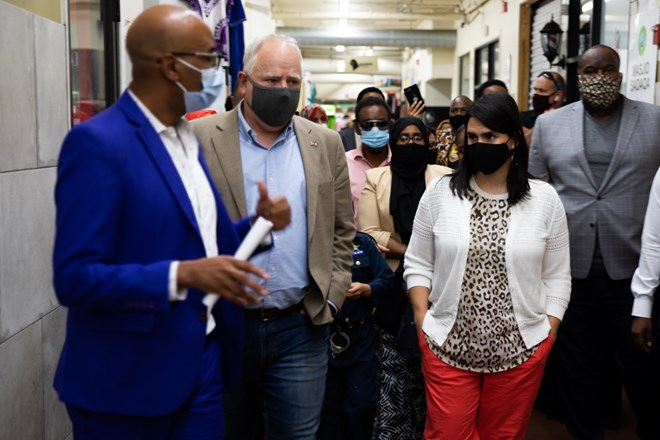
By JOEY PETERS
Wednesday August 5, 2020
“It is important for the governor to show they’re not forgetting us”: East African business owners call for help amid an economic crisis.

Bashir Garad, who owns Safari Travel and Accounting Services, guides Governor Tim Walz and Lieutenant Governor Peggy Flanagan through Karmel Mall on Monday, August 3, 2020. Credit: Jaida Grey Eagle | Sahan Journal
As two black vans carrying Governor Tim Walz and Lieutenant Governor Peggy Flanagan pulled into the crowded parking lot of Karmel Mall on Monday afternoon, a boy wearing a police outfit did his best to enforce social-distancing rules.
“Six feet apart!” the boy said, as he tried, often in vain, to enforce Walz’s own executive order among the dozens of masked business owners eagerly awaiting the governor’s arrival.
After both Walz and Flanagan emerged from their cars, a smiling Basim Sabri, who owns Karmel Mall, explained that the boy is his six-year-old son.
“I just want to tell you, I have never felt more secure than I have here with him in my security detail,” Walz yukked back, generating laughter from the crowd. The brief gubernatorial visit, which lasted about a half hour, wasn’t just an exercise in retail politics. The tour came about through the Somali Business Task Force COVID-19, a group formed by local business owners and faith leaders in response to the pandemic. And it aimed to address the huge business disruptions experienced by immigrant entrepreneurs, and the suggestions of discontent with government aid.
In a sense, the tour presented an opportunity for the governor to show his face (behind a mask, of course) to the community. Walz and Flanagan took a quick stroll through a portion of the mall, which is home to nearly 500 East African–owned storefronts. It sits in the heart of a south Minneapolis area devastated by property damage following protests over the police killing of George Floyd. A crowd of people trickled behind Walz and Flanagan as they walked through the hallways and greeted a few of the mall merchants.
Both Walz and Flanagan pledged their support to help the community rebuild the area.
“Thank you for making Minnesota your home,” Walz told the merchants afterward in the parking lot. “The commitment you feel not just from us, but from your neighbors, is unwavering.”
But Walz also sneaked in jabs at the Republican-controlled state Senate. During two special sessions, legislators there declined to pass a relief bill for Lake Street businesses damaged during the unrest.
“We need to continue to push the Legislature to help rebuild these areas,” Walz said.
Mohamed Amin Kahin, a local activist formerly involved with the DFL, didn’t buy this explanation. If Walz’s administration really cares about the local East African community, Mohamed argued, the governor would support it by directly investing part of the state’s $841 million federal CARES funds. (Walz has previously announced he intends to divy up CARES money to local governments across the state.)
“To be honest, we expect more from the governor,” Mohamed told Sahan Journal afterward. “The East African community has invested so much in the DFL. The return is just zero.”
Last month, the Federal Emergency Management Agency rejected a request from Walz to help repair the area following the George Floyd unrest. On the same day as his Karmel Mall visit, Walz requested disaster assistance from the U.S. Small Business Administration. That request is pending.
‘The East African community is not the center of power in politics in Minnesota’
After brief speeches, Walz and Flanagan stayed for a few minutes to hear from a handful of business owners. They both praised the governor and described their own hardships. One by one, the business owners gathered in the center of a small human circle in the mall’s parking lot to make their statements.
Mohamud Isse, who runs Hirey Insurance Agency on the mall’s second floor, thanked Walz for his leadership. Mohamud’s insurance business slumped in the spring in the weeks following the pandemic shutdown. He applied for a Paycheck Protection Program loan from the federal government and received it. He said most of his East African business peers were not as lucky.
Sahra Mohmoud, who owns clothing store 135 in the mall, told Walz that immigrant business owners like her were suffering a loss of sales during the pandemic and needed support. Sahra’s shop is among the 90 percent of businesses at Karmel Mall that are woman-owned.
Khadija Ali, one of the chairs of the business task force, said the visit offered an opportunity to open a conversation with the governor’s office.
Khadija. who owns Global Language Connections, an interpreting agency located on Lake Street, said the governor’s office could be more helpful in helping East African business owners navigate the many support programs designed to help. But she added that she doesn’t think the governor’s office has the capacity to meet all the community’s needs.
“The East African community is not the center of power in politics in Minnesota,” she said. “So it is important for the governor to show us that they’re not forgetting us.”
Shortly after 2 p.m., Governor Walz and his entourage piled back into their two black vans and drove to his next stop: the nearby Jigjiga Business Center and another crowd of struggling East African business owners.